Joel Minor is curator of the Modern Literature Collection and manuscripts at Washington University’s Olin Library.
Note: Charles Johnson will speak during two events at Washington University on Thursday, March 3, 2022 (details below).
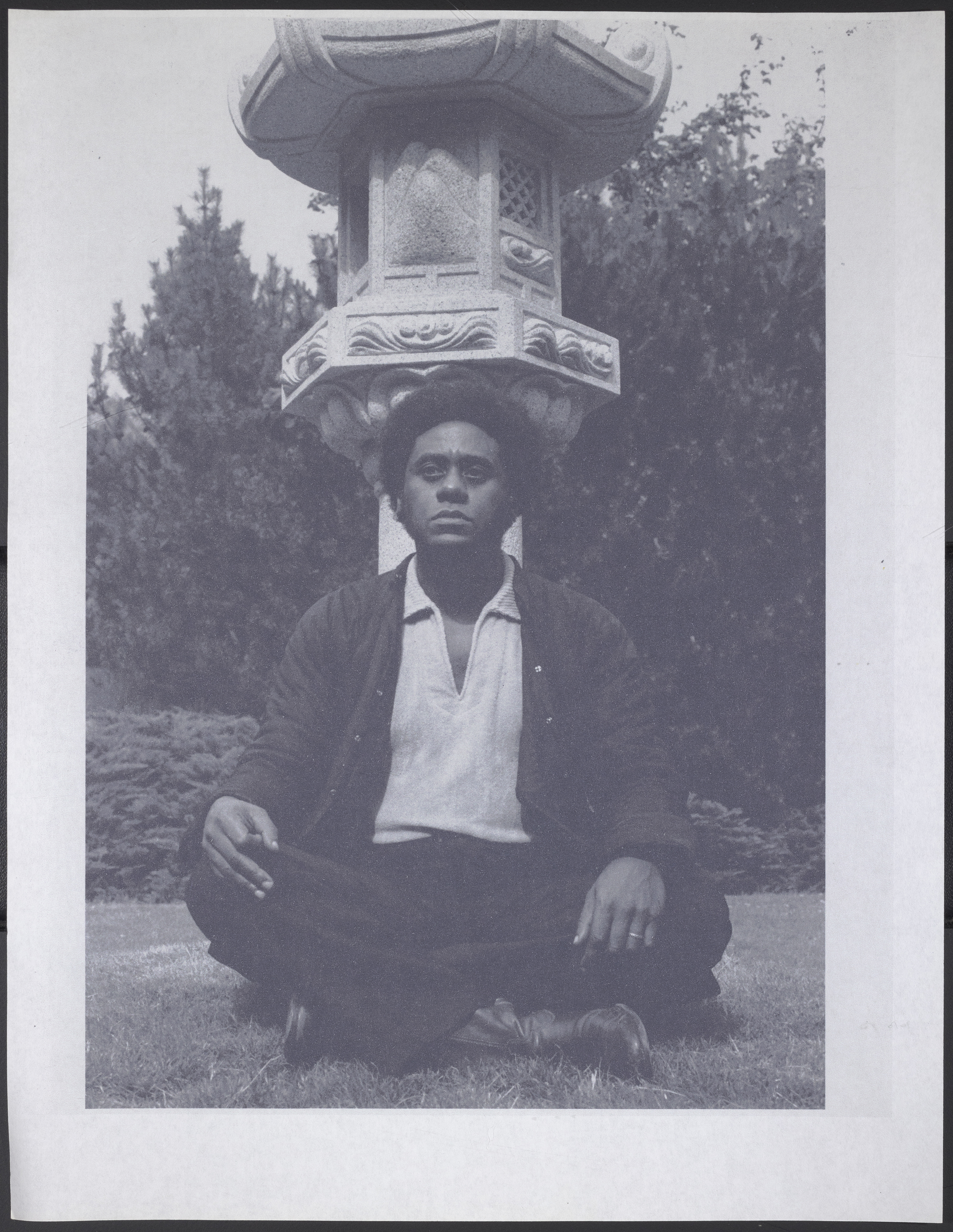
The significance of the Charles Johnson Papers to the Julian Edison Department of Special Collections is as multifaceted as the man himself. A new exhibition in the Special Collections Reading Room in Olin Library presents some of those facets and shows how Johnson often transcends their presupposed boundaries.
The following article presents highlights from the exhibition, which will be on display in the Julian Edison Department of Special Collections Reading Room, Olin Library, from February 23 to April 1, 2022. The Reading Room is open Monday to Friday from 9 am to 5 pm.
The Cartoonist
Johnson was born and raised in Evanston, Illinois. He wanted to be a cartoonist from a very young age, and he also excelled in literature and journalism. In high school he began writing stories and drawing comic strips for his school newspaper, and submitting his artwork to major publishers.
By the time he entered Southern Illinois University Carbondale (SIU) in 1966, he was a published cartoonist, and he found work immediately at the Southern Illinoisan newspaper, where he worked for four years as he studied for a journalism degree.

From 1965 to 1972, he produced hundreds of drawings and cartoons for many different clients and publications, and published two books of his comic art, Black Humor and Half-Past Nation-Time. In 1970, Johnson created, hosted and co-produced Charlie’s Pad, a PBS how-to-draw series that ran nationally for a decade in the U.S. and Canada.
The Philosopher
Johnson has a PhD in philosophy, has taken vows as a Soto Zen Buddhist, is a lifelong Kung Fu practitioner and has become a Sanskrit scholar in recent years, all of which have influenced his fiction and nonfiction writing. He has described his interests as “that place where fiction and philosophy — both Eastern and Western — meet.”
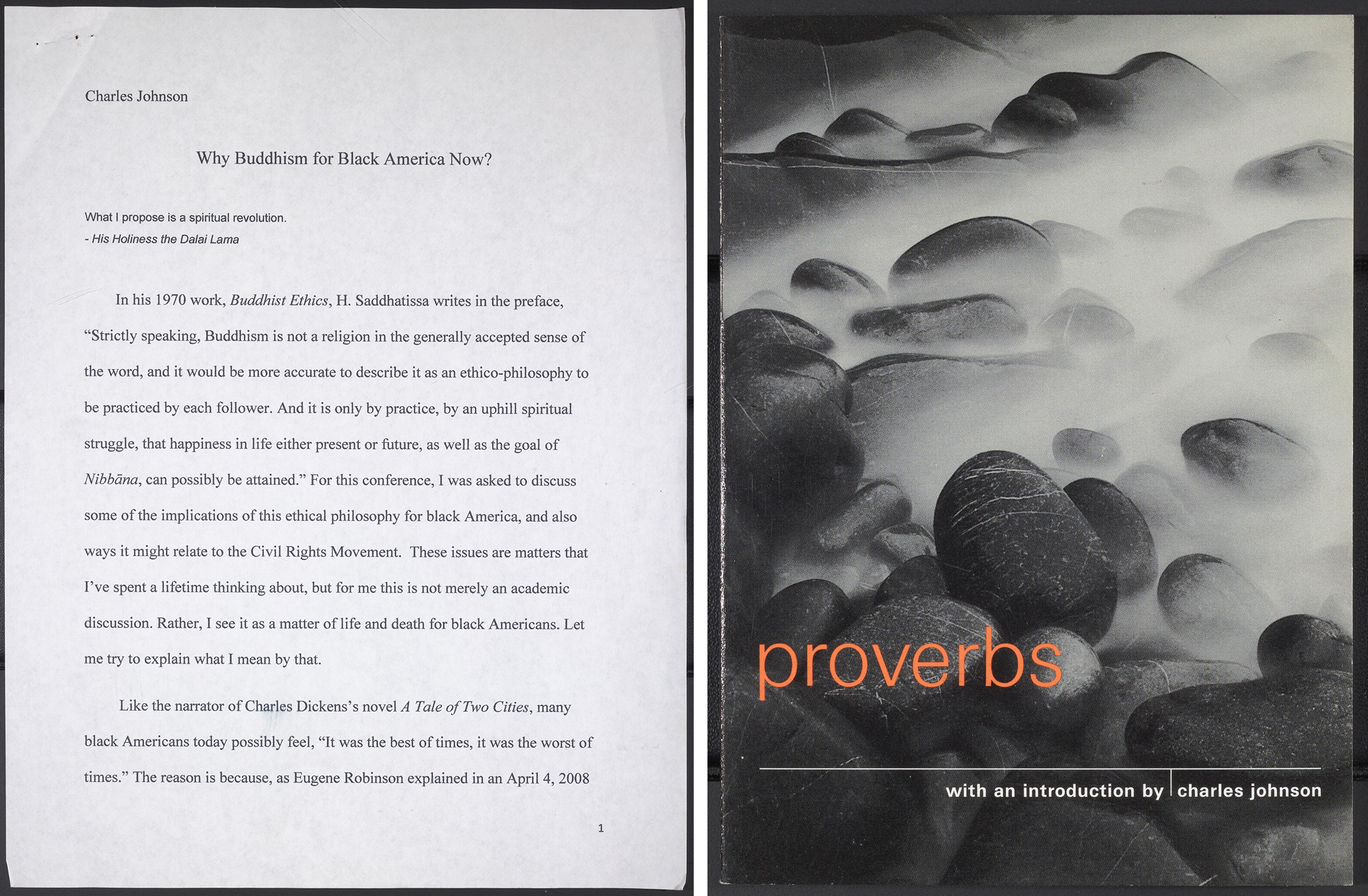
Buddhism is not the only religion Johnson is adept at mining for practical philosophical purposes. Again, he looks to both Eastern and Western traditions in this practice — particularly, Buddhist, Hindu and Judeo-Christian texts.
In the textbook Philosophy: An Innovative Introduction, Johnson and his coauthor Michael Boylan take an innovative approach to the study of philosophy by pairing short stories written by Boylan and Johnson with pivotal aspects of selected classic readings. The book, also in the exhibition, is a prime example of Johnson’s core interest in fiction and philosophy coming together for pedagogical purposes.
The Novelist
Back in college and graduate school, as Johnson was following his callings as a cartoonist, journalist and philosopher, he heard another calling when on a whim he took a class by novelist John Gardner. Soon Gardner became his creative writing mentor at SIU-Carbondale and later played a major role in the editing and shaping of Johnson’s first published novel, Faith and the Good Thing (1974).
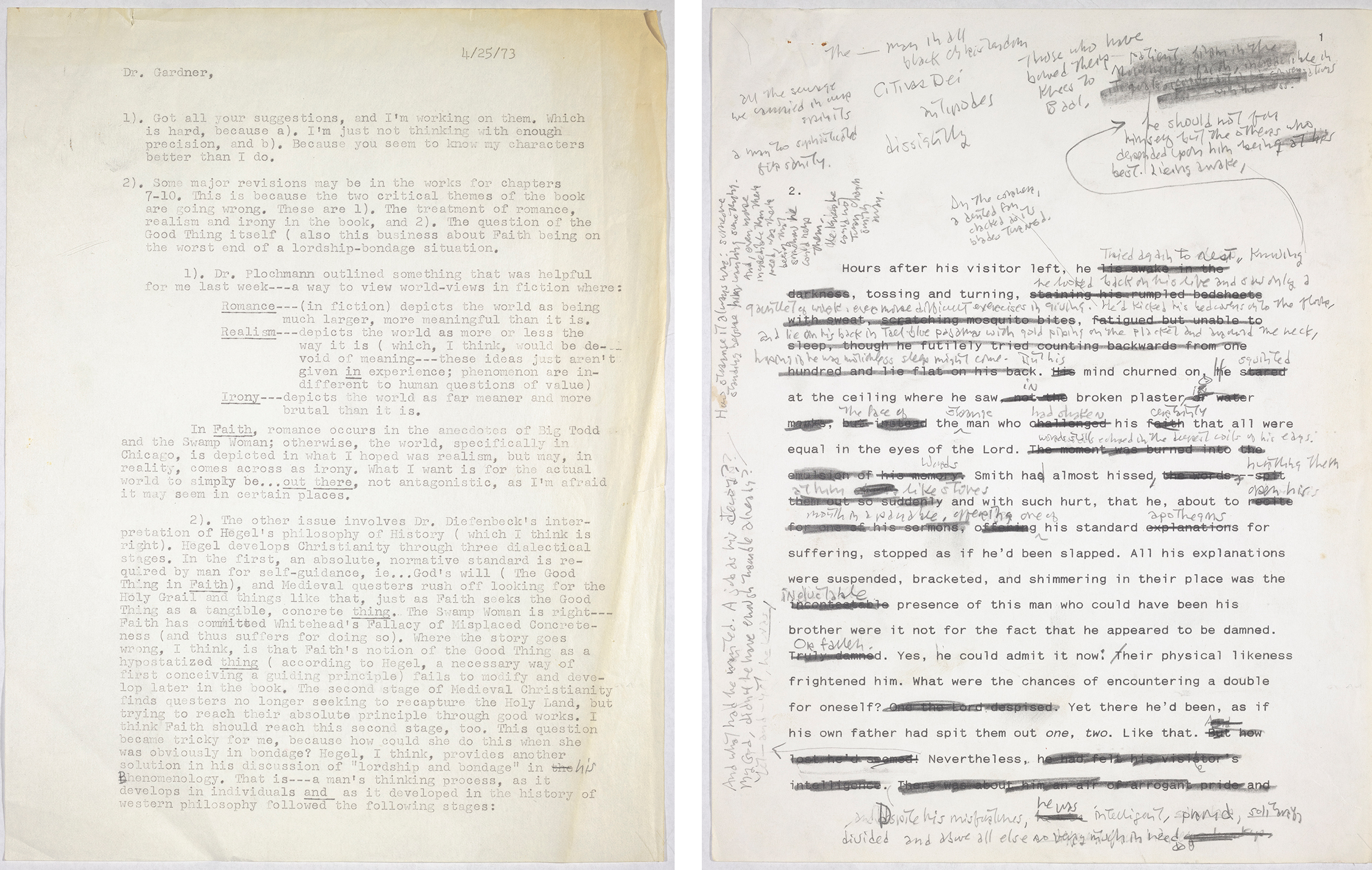
His ensuing novels — Oxherding Tale (1982), Middle Passage (1990) and Dreamer (1998) — all incorporated philosophies and folktales from various traditions into compelling historic narratives, sometimes mixed with magical realism. His literary awards are numerous, but most significant is the 1990 National Book Award for Middle Passage. Two of his novels have been adapted for the stage, and all have been translated into numerous languages.
The Professor
In 1973, Johnson began PhD studies in philosophy at SUNY Stonybrook, and in 1976 he became acting assistant professor in the English department at the University of Washington (UW). He earned his PhD from Stonybrook in 1988, and in 1990 he became the first endowed writing chair at UW.
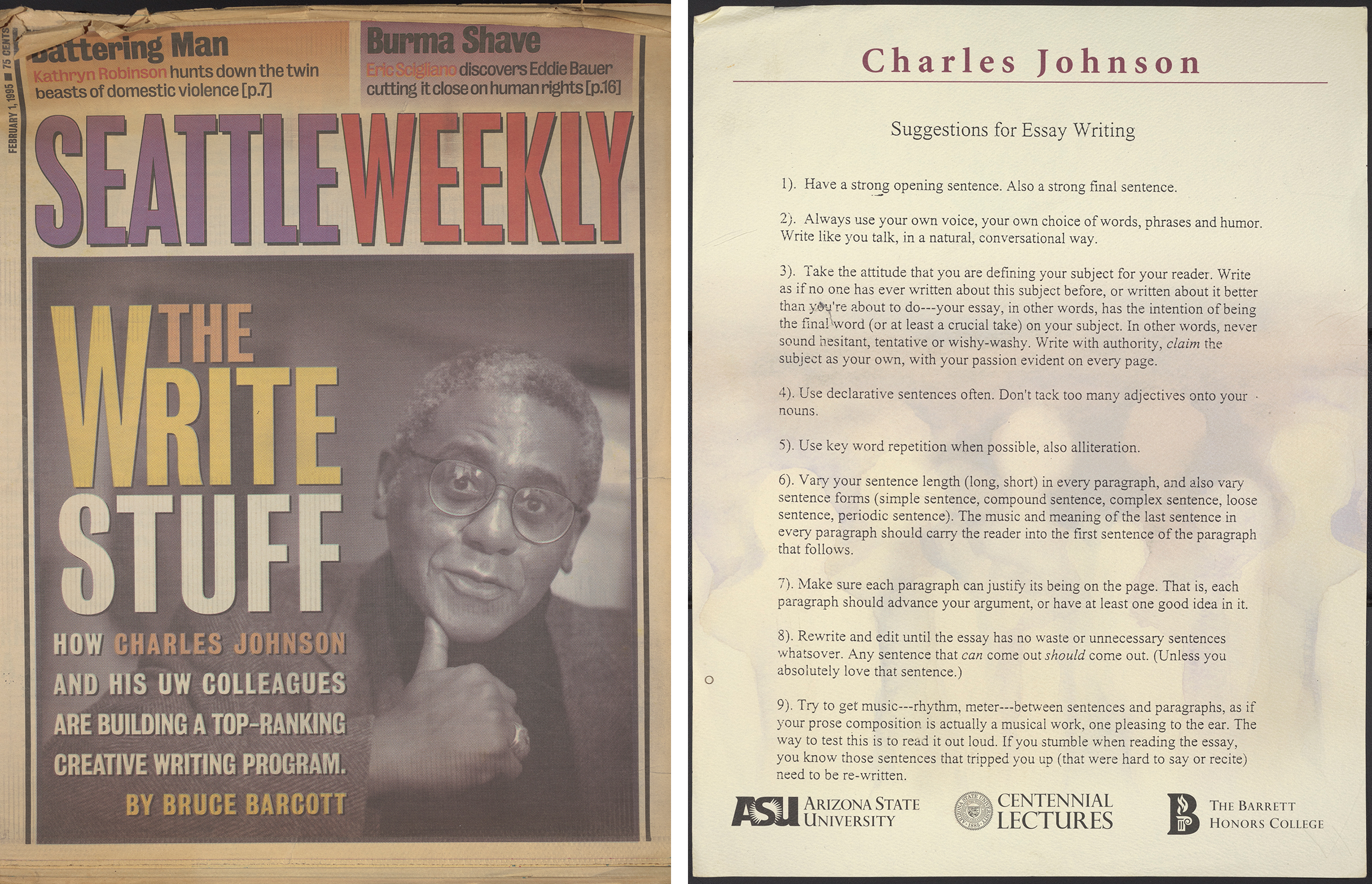
Johnson directed the UW creative writing program and was fiction editor of Seattle Review for 20 years. He retired from teaching in 2009 and has been the S. Wilson and Grace M. Pollock Professor Emeritus ever since. Both before and after retirement he has taken on visiting professorships and residencies at various universities, given lectures, served on panels and more.
His pedagogical influence is also evident at his alma maters. Johnson founded and financially sponsors the Marie Clair Davis Award in Creative Writing, given to a secondary student at Evanston Township High School each year. In 1994, SIU-Carbondale started the annual Charles Johnson Student Fiction Award, a national contest intended to encourage increased artistic and intellectual growth and to reward excellence and diversity in creative writing.
The Screenwriter
From the mid ’70s to the mid ’90s, Johnson was an active and successful scriptwriter, mainly for television. In all he wrote over 20 screenplays and teleplays, and his papers contain not only drafts but materials toward production and promotion, such as with Charlie and the Fritter Tree, a fictionalized retelling of the life of the oldest living American at the time, a 134-year-old ex-slave and cowboy named Charlie Smith. The movie first aired on PBS in 1978.
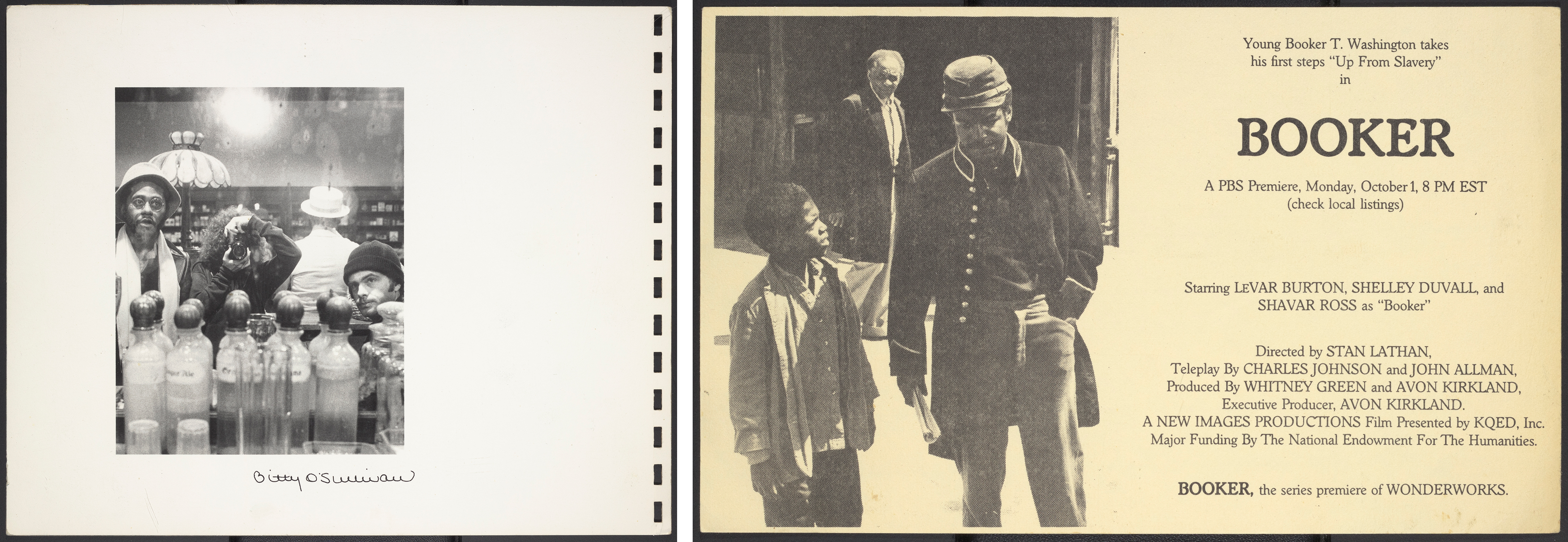
The PBS movie cowritten by Johnson about the influential educator, orator, writer and presidential advisor Booker T. Washington (Booker), received multiple awards, among them the 1985 Writers Guild Award for outstanding script in the category of television children’s show.
Unproduced projects are found in the Charles Johnson Papers, too, including a wide range of materials related to a 1994 attempt to adapt “The Black Panther” into a film starring Wesley Snipes. In the exhibition we included a film treatment and a holograph note from Marvel publisher Stan Lee.
The Essayist
Johnson regularly contributes essays and introductions to books and periodicals on a wide variety of topics, including civil rights, literature, spirituality, aesthetics and storytelling. As you can see, he puts as much effort revising and crafting these works as he does his fiction.
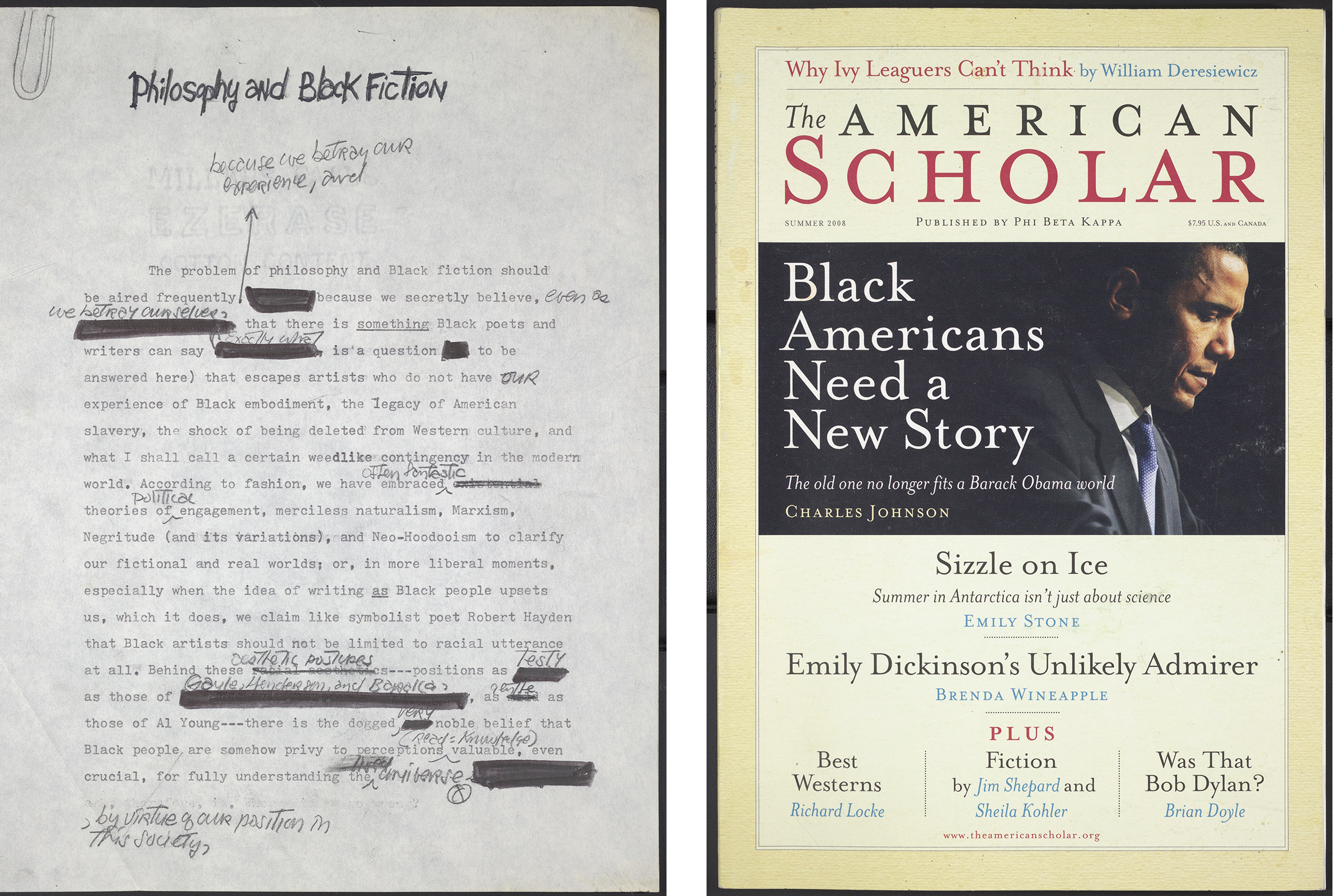
So far, Johnson has published nine books of nonfiction, including guides to philosophy, storytelling, Buddhism and to being a grandparent. Since the early 1990s he has contributed introductions, prefaces, afterwords and more to at least 17 books.
The Literary Scholar
As with his fiction, Johnson mixes philosophy and social commentary into his literary scholarship. His first book of nonfiction, Being and Race: Black Writing Since 1970, a book of aesthetics published in 1988, is a case in point.
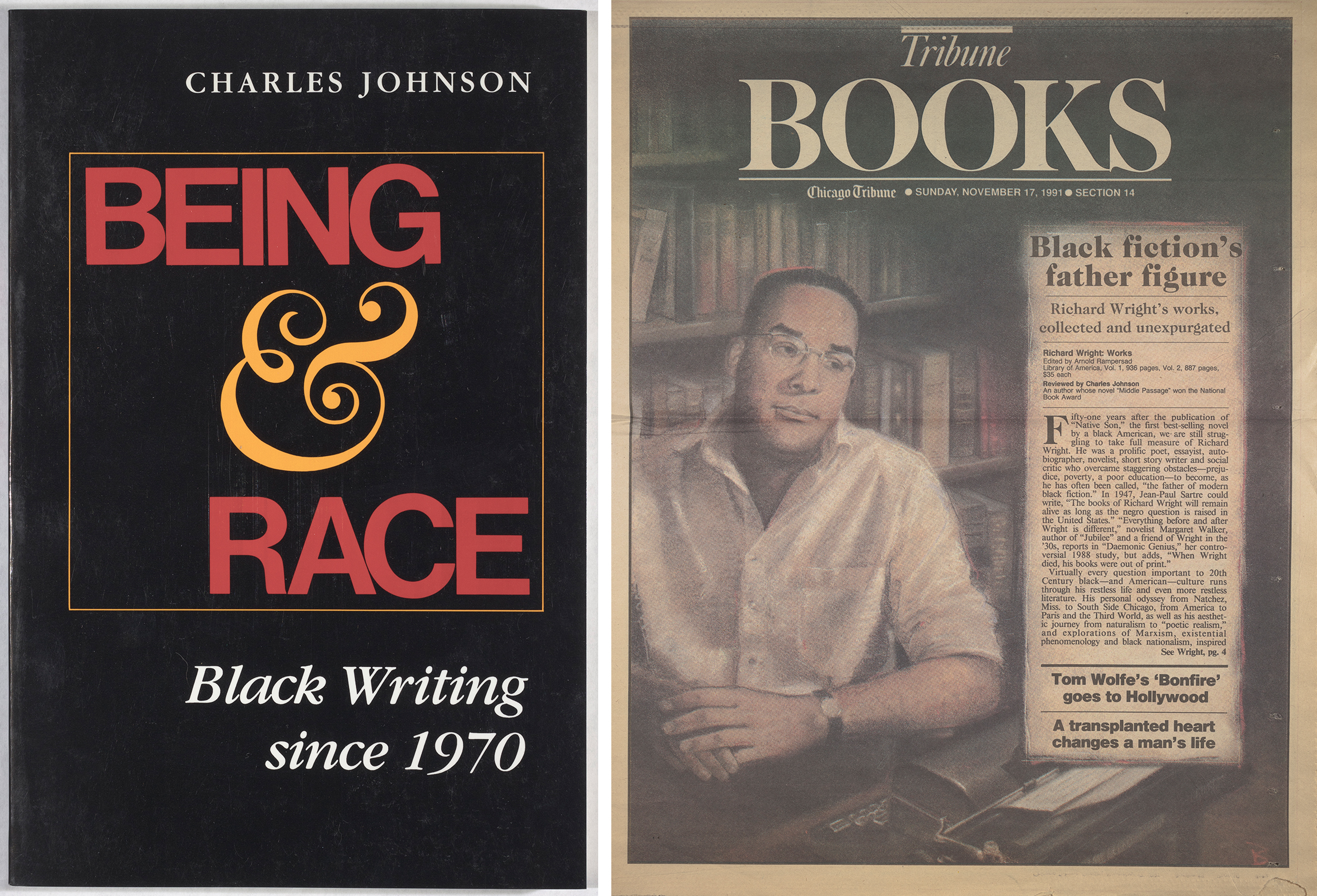
Johnson’s 60+ book reviews and critical essays have appeared in major newspapers across the U.S. and U.K. He covers new books by contemporaries as well as major new works about or by important predecessors.
Last year, Johnson guest-edited a special issue of Chicago Quarterly Review, an Anthology of Black American Literature with 28 writers, poets and artists. The issue includes work by Aaron Coleman and Sharyn Skeeter, both of whom now also have papers in the Julian Edison Department of Special Collections.
The Short Fiction Writer
Last, we can’t overlook Johnson’s accomplishments in short fiction. His short stories began appearing in publications in the late ’70s and have been widely anthologized, most recently in The Penguin Book of the Modern American Short Story (2021), described on the jacket as “a selection of the best and most representative contemporary American short fiction from 1970 to 2020.” His stories have been awarded such prizes as the Pushcart and the O. Henry, and collected into four books so far.
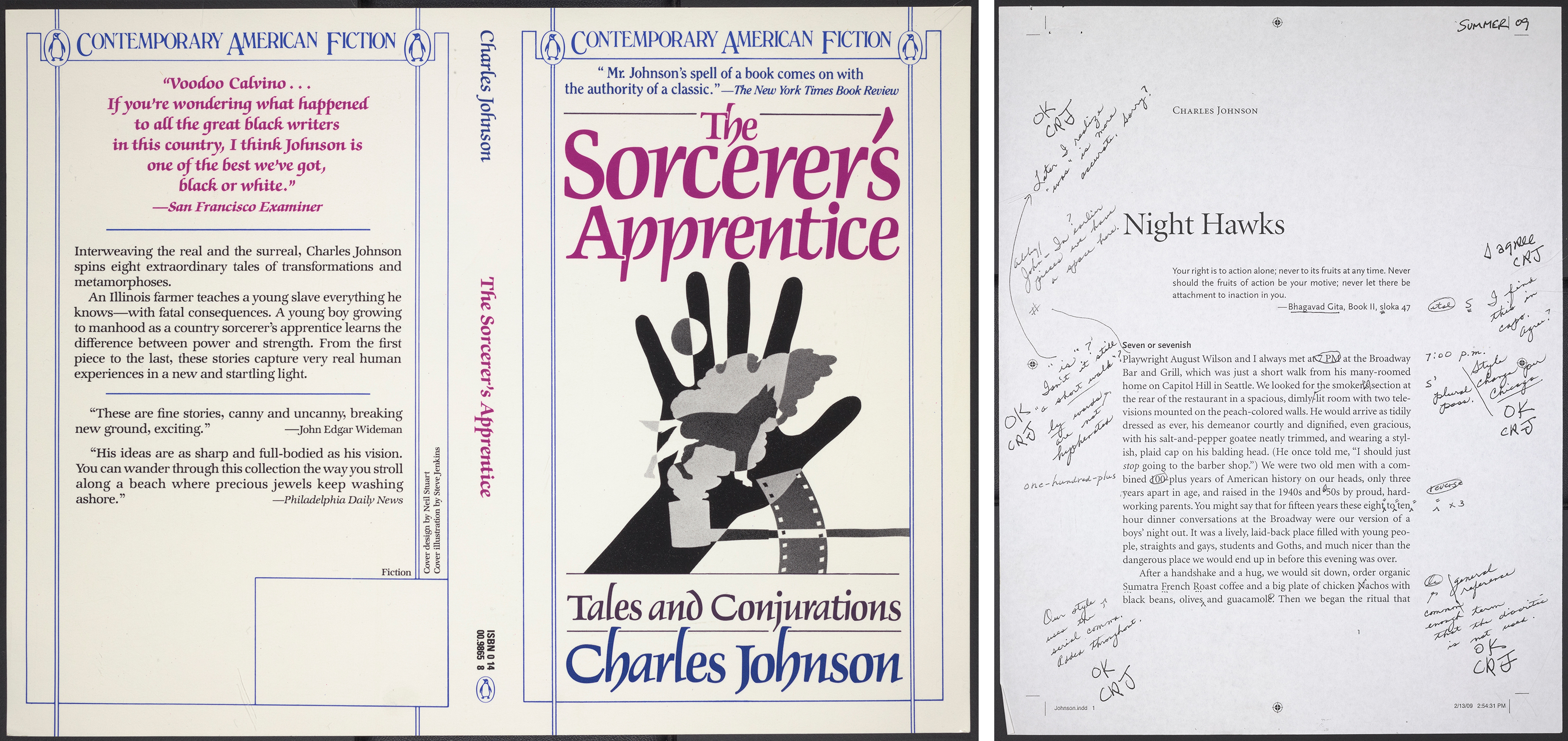
One of the treasures of the Charles Johnson Papers are the troves of correspondence, perhaps most significantly with the acclaimed poet and playwright August Wilson. They wrote each other — often via faxes — extensively, even though they also got together frequently for long, late-night conversations, which Johnson documented in his short story (thereby transcending the fiction-nonfiction divide), “Night Hawks.”
The Charles Johnson Papers are currently being processed and will be ready for research by the end of 2022. Contact Special Collections at spec@wumail.wustl.edu or (314) 935-5495 with questions or access requests.
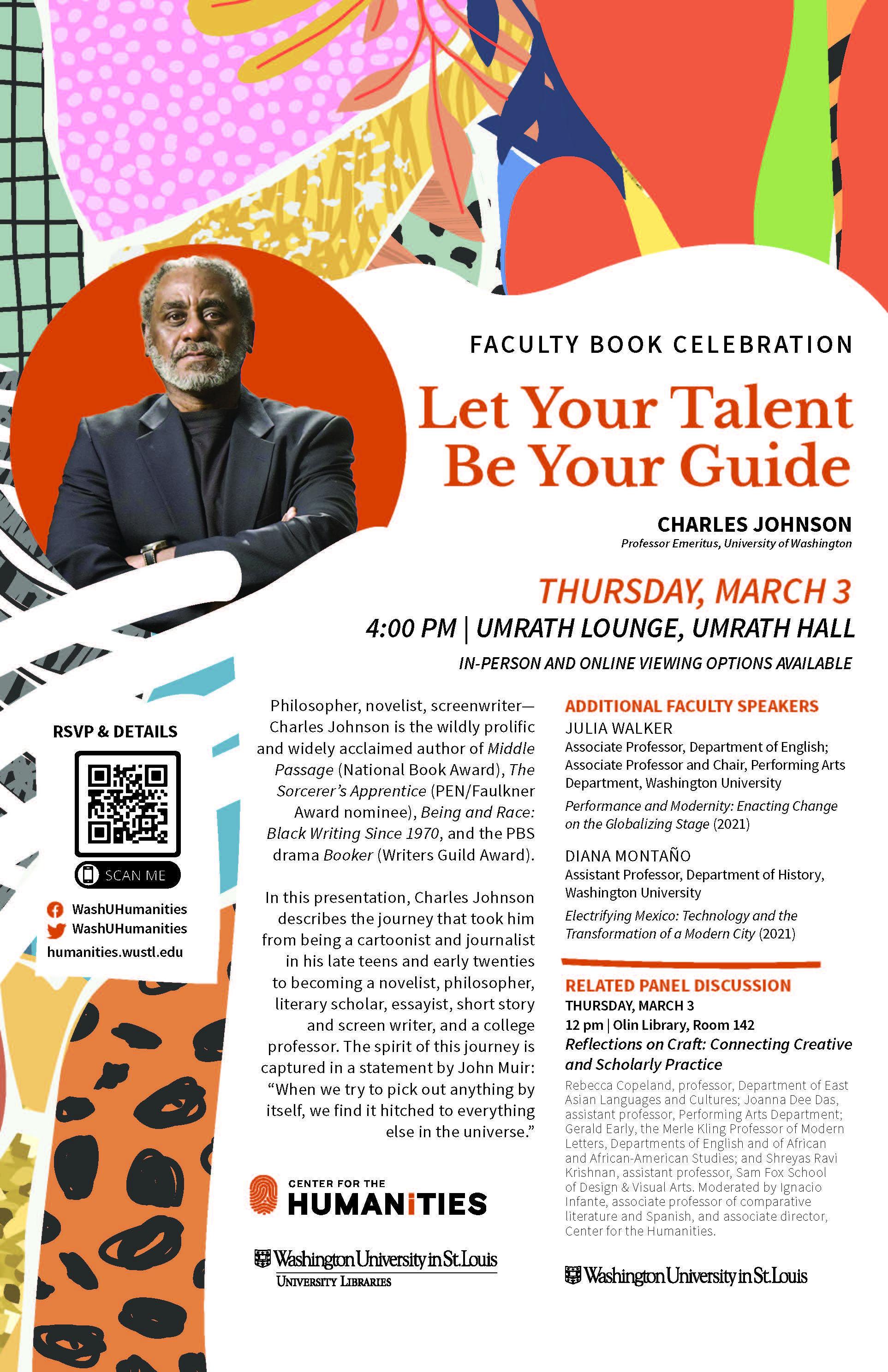
CHARLES JOHNSON SPEAKS AT THE FACULTY BOOK CELEBRATION
Thursday, March 3, 2022
12 pm | Panel discussion, “Reflections on Craft: Connecting Creative and Scholarly Practice” | Olin Library, Room 142
4 pm | Keynote lecture, “Let Your Talent Be Your Guide,” Faculty Book Celebration | Umrath Lounge
Online and in-person viewing opportunities available
Sponsored by the Center for the Humanities and University Libraries




